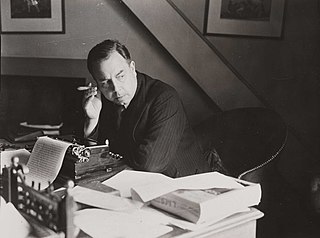A Quote by J. B. Priestley
Man, the creature who knows he must die, who has dreams larger than his destiny, who is forever working a confidence trick on himself, needs an ally. Mine has been tobacco.
Related Quotes
Man... knows only when he is satisfied and when he suffers, and only his sufferings and his satisfactions instruct him concerning himself, teach him what to seek and what to avoid. For the rest, man is a confused creature; he knows not whence he comes or whither he goes, he knows little of the world, and above all, he knows little of himself.
Man stands alone in the universe, a unique product of a long, unconscious, impersonal, material process with unique understanding and potentialities. These he owes to no one but himself, and it is to himself that he is responsible. He is not the creature of uncontrollable and undeterminable forces, but is his own master. He can and must decide and manage his own destiny.
Man can will nothing unless he has first understood that he must count on no one but himself; that he is alone, abandoned on earth in the midst of his infinite responsibilities, without help, with no other aim than the one he sets himself, with no other destiny than the one he forges for himself on this earth.
The things a man has to have are hope and confidence in himself against odds, and sometimes he needs somebody, his pal or his mother or his wife or God, to give him that confidence. He's got to have some inner standards worth fighting for or there won't be any way to bring him into conflict. And he must be ready to choose death before dishonor without making too much song and dance about it. That's all there is to it.
The Scoutmaster guides the boy in the spirit of an older brother... He has simply to be a boy-man, that is: (1) He must have the boy spirit in him: and must be able to place himself in the right plane with his boys as a first step. (2) He must realise the needs, outlooks and desires of the different ages of boy life. (3) He must deal with the individual boy rather than with the mass. (4) He then needs to promote a corporate spirit among his individuals to gain the best results.
In the absence of government each man learns to think, to act for himself, without counting on the support of an outside force which, however vigilant one supposes it to be, can never answer all social needs. Man, thus accustomed to seek his well-being only through his own efforts, raises himself in his own opinion as he does in the opinion of others; his soul becomes larger and stronger at the same time.
When a man's life is over, it remains true that he was one sort of man and not another. A man who understands himself under the form of eternity knows the quality that eternally belongs to him, and knows that he cannot wholly die, even if he would, for when the movement of his life is over, the truth of his life remains.
What becomes of a man who acquires a beautiful woman, with her 'beauty' his sole target? He sabotages himself. He has gained no friend, no ally, no mutual trust: She knows quite well why she has been chosen. He has succeeded in buying something: the esteem of other men who find such an acquisition impressive.





































